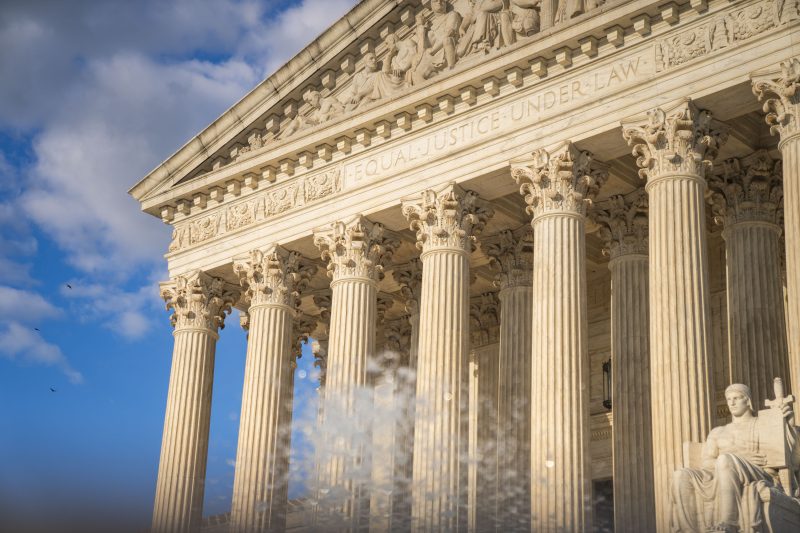About two in three Americans support imposing term limits on Supreme Court justices, but only three in 10 back expanding the size of the court — a proposal offered up by congressional Democrats and court transparency advocates as a way to dilute the power of the court’s 6-3 conservative supermajority.
The Annenberg Constitution Day Civics Survey also found that 69 percent of Americans believe there should be a mandatory retirement age for the justices.
President Joe Biden called this summer for 18-year term limits for the justices, with future presidents able to nominate a justice every two years. He also backed legislation that would create an enforceable ethics code for the justices, who published their own code last year but did not include a way to investigate potential violations or mete out sanctions.
Vice President Kamala Harris, the Democratic nominee for president, has endorsed Biden’s proposals, which came in response to ethics scandals involving some of the justices and several rulings that overturned long-standing precedent.
GOP nominee Donald Trump and other Republicans dismiss the ideas as efforts to thwart the court’s right-leaning majority, which Trump cemented with the appointment of three very conservative justices. That majority has overturned Roe v. Wade, ended affirmative action in college admissions, greatly expanded presidential immunity for official acts and weakened the regulatory power of federal agencies.
Nearly half of Americans support allowing the public to vote to overturn Supreme Court decisions on controversial issues, according to the survey. Nearly eight in 10 support the creation of an enforceable ethics code for the high court, and 82 percent say Supreme Court justices should be barred from participating in cases in which they have “personal or financial interests.”
Chief Justice John G. Roberts Jr. announced last fall that the court had agreed to follow an ethics code specific to the nine justices. But the ethics code does not include an enforcement mechanism or any outside oversight of the justices’ individual decisions about whether to recuse from certain cases because of perceived or potential conflicts of interest.
The court adopted its code after news reports revealed that Justice Clarence Thomas had accepted but did not disclose on his financial reports years of luxury gifts and trips from Dallas billionaire and Republican donor Harlan Crow, as well as real estate deals and other financial transactions. Justice Samuel A. Alito Jr. faced similar criticism for not reporting a 2008 luxury fishing trip arranged by conservative judicial activist Leonard Leo with private jet travel provided by billionaire hedge fund manager Paul Singer.
Both Alito and Thomas have said disclosure rules at the time did not require reporting private jet travel or luxury accommodations provided by friends.
Confidence in the Supreme Court plunged 22 percentage points — from 68 percent to 46 percent — between 2019 and 2022, according to the Annenberg survey. And seven out of 10 Americans believe the justices are guided by their ideology and do not rule impartially, according to a June poll from the Associated Press-NORC Center for Public Affairs Research.
Alito also came fire under this year after reports of politically provocative flags flown outside his homes. The justice has said that his wife, Martha-Ann Alito, was responsible for flying both an upside-down American flag at their Virginia home in the weeks after the Jan. 6, 2021, attack on the U.S. Capitol and an “Appeal to Heaven” flag at their vacation home in New Jersey.
The justice declined calls for him to sit out two Jan. 6-related cases because those flags have been associated with some people who falsely claimed the 2020 election was stolen and that Trump had won. Alito said his wife flew the upside-down flag after a neighborhood dispute and the couple were unaware the “Appeal to Heaven” flag had associations with the “Stop the Steal” movement. Both flags had long histories and other meanings not associated with Jan. 6.
Congressional Democrats and court transparency advocates have pressed the justices to adopt a binding code of conduct to restore public confidence in the institution.
Justice Elena Kagan has said she would support the creation of a committee of judges to examine potential violations of the Supreme Court’s ethics code. Having an oversight committee composed of renowned lower-court judges “seems like a good idea to me in terms of ensuring that we comply with our code of conduct going forward in the future; it seems like a good idea in terms of ensuring that people have confidence that we’re doing exactly that,” Kagan said earlier this week during a conversation at New York University Law School with professor Melissa Murray, co-host of a liberal podcast about the court called “Strict Scrutiny.”
Any congressional effort to impose term limits or ethics legislation faces an uphill battle in the Republican-controlled House and narrowly divided Senate. Both proposals would require 60 votes to pass the Senate, but Democrats only hold 51 seats there.
The survey is conducted annually by the University of Pennsylvania’s Annenberg Public Policy Center to mark Constitution Day, which falls on Sept. 17. It also probes Americans’ knowledge of First Amendment protections, the branches of government and party control of Congress, among other topics.
Freedom of speech was the most recognized right guaranteed under the First Amendment, with 74 percent identifying the protection. However, less than half could name most of the rights protected under the First Amendment, according to the survey.
The center’s analysis of the survey results found that the relationship between civics knowledge and support for Supreme Court reforms varies by political affiliation. While the most knowledgeable Democrats and independents are slightly more likely to want to reform the court, the most knowledgeable Republicans are considerably less likely to want to reform the court, according to the survey.





























